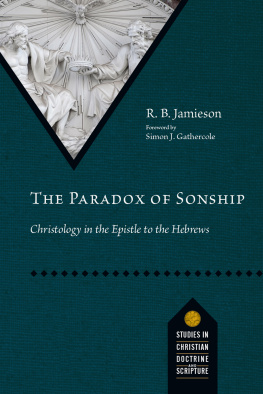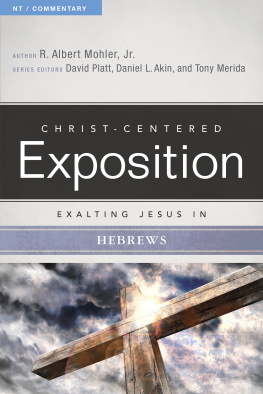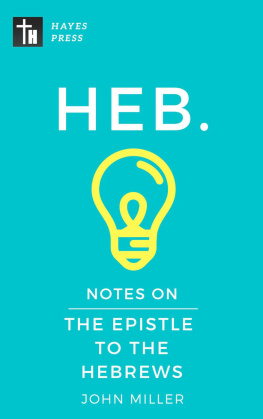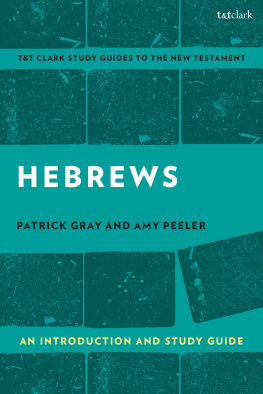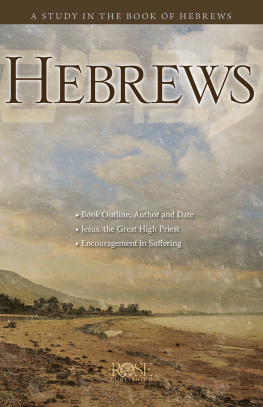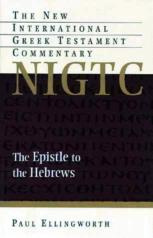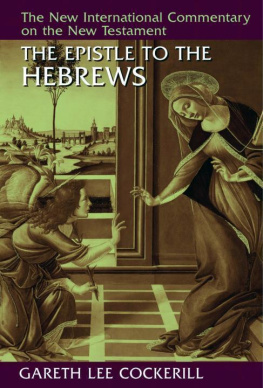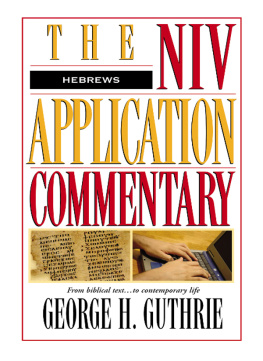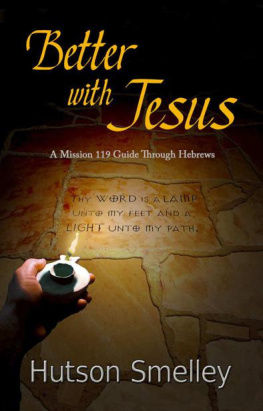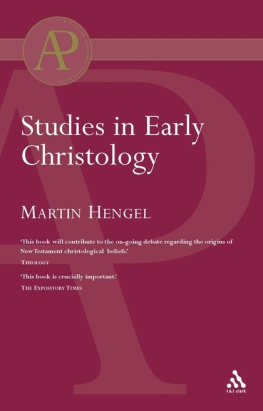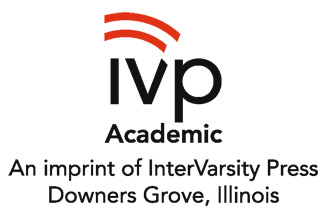Sommaire
Pagination de ldition papier
Guide
THE PARADOX OF SONSHIP
Christology in the Epistle to the Hebrews
R. B. Jamieson
Foreword by
Simon J. Gathercole
InterVarsity Press
P.O. Box 1400, Downers Grove, IL 60515-1426
ivpress.com
2021 by R. B. Jamieson
All rights reserved. No part of this book may be reproduced in any form without written permission from InterVarsity Press.
InterVarsity Pressis the book-publishing division of InterVarsity Christian Fellowship/USA, a movement of students and faculty active on campus at hundreds of universities, colleges, and schools of nursing in the United States of America, and a member movement of the International Fellowship of Evangelical Students. For information about local and regional activities, visit intervarsity.org.
Scripture quotations, unless otherwise noted, are from The Holy Bible, English Standard Version, copyright 2001 by Crossway Bibles, a division of Good News Publishers. Used by permission. All rights reserved.
The publisher cannot verify the accuracy or functionality of website URLs used in this book beyond the date of publication.
Cover design: Cindy Kiple
Image: White marble sculpture manx_in_the_world / iStock / Getty Images Plus
ISBN 978-0-8308-4887-4 (digital)
ISBN 978-0-8308-4886-7 (print)
This digital document has been produced by Nord Compo.
Foreword
Simon J. Gathercole
T HE EPISTLE TO THE HEBREWS exhorts its readers to leave behind elementary christological teaching and move on to richer fare. This is certainly a step I had to take while supervising Bobby Jamiesons thesis, published in 2018 as the Cambridge University Press monograph Jesus Death and Heavenly Offering in Hebrews. I was rather embarrassingly ill equipped to supervise a thesis on Hebrews, the sum total of my research on the epistle amounting to four pages in a book on preexistence. It was Bobby who introduced me to the complex debates on how Jesus death related to his activity in the heavenly sanctuary, in what sense Jesus could be perfected, and how Hebrews cosmology can best be understood so that we can account for all the evidence of the epistle. Bobby is undoubtedly one of the best exegetes I have known, and our meetings consisted of collegial scholarly conversations rather than a teacher spouting forth wisdom to an ignorant student. His astonishing intellectual energy is evident from the fact that he wrote a first draft of this book moonlighting during the final months of finishing his doctoral thesis.
There are several points I could make about this book. Bobbys argumentation both in the PhD monograph and this present book is characterized by logical rigor. There is no legerdemain that glides over the steps in the argument or replaces them with rhetorical bluster. The opponents, of which there are quite a few in this book, are invariably treated accurately and courteously. The marvelous footnotes demonstrate mastery of a massive body of secondary literature. The expansive range of the book also extends to The Lord of the Rings, and for those who have ears to hear the allusion, Yes, Ministerdemonstrating that Bobbys time in Britain was not entirely wasted. The most impressive feature of the range of material covered is its venturing into patristic territory. Most New Testament scholars (myself included) do not feel confident enough to make constructive use of Gregory of Nyssa or Cyril of Alexandria. As I would have expected, however, Bobbys venture here is conducted intelligently and carefully, demonstrating that patristic theology provides a grammar that can shed light on the theological substructure of Hebrews. In discussing the analogous case of Paul, Frances Young and David Ford remark that it is possible for someone to speak perfectly grammatically without ever consciously knowing any grammar. Along similar lines, Bobby elucidates the way in which Hebrews makes apparently paradoxical statements best understood as expressions arising out of a particular theological grammar. This substructure is only later theorized in the theology of the church fathers and councils, but it can legitimately be regarded as already proper to Hebrews own theology. Such a claim that Hebrews has a sophisticated doctrinal substratum is not an anachronism: as Bobby shows, it is not merely that the epistle provides raw material out of which theology can be constructed; the author of Hebrews is also himself a theologian engaged with the question posed by Leontius of Jerusalem: What is Christ? ( ; ).
I have already detained the reader too long with this mere shadow of the good things to come. What follows is a brilliant study that grapples seriously with the central subject matter of Scripture, and for that we can rejoice.
Acknowledgments
A wise man once said that writing a second academic book is in some ways more daunting than doing a PhD, since you no longer have a more experienced scholar steering you away from danger. So I am deeply thankful to that wise man, Simon Gathercole, for not only supervising my PhD but also generously reading, and even commending, this book too. Surely no doctoral supervisor should have to digest and dissect as many half-baked arguments as I have inflicted on him!
Matthew Crawford deserves special thanks not only for reading the whole manuscript but also for answering a years-long volley of questions about all things patristic, especially all things Cyril. No one who knows Matt would be surprised to learn that I am indebted to him not only for academic insight but for many cheerful kindnesses over several years. I am also very grateful to Jonathan Linebaugh for reading the entire manuscript and offering feedback that was as encouraging as it was penetrating. Far beyond how they enriched this book, our conversations were a highlight of my time in Cambridge, now sorely missed.
Other friends and colleagues who read and commented on all or part also deserve thanks: Peter Gurry, Mike Kibbe, Arthur Keefer, Tyler Wittman, and Tim Bertolet. Special thanks are due to Madison Pierce for kindly obtaining a couple sources on short notice late in the publication process. I am also grateful to the Cambridge Graduate New Testament seminar for probing feedback on an early version of , and to the members of the Hebrews group at the September 2016 meeting of the British New Testament Society, especially Justin Duff, Owen Edwards, and (again!) Madison Pierce, for shaking down a paper that previewed the whole book. I am especially thankful to the chair of that session, David Moffitt, whose writings and conversation have greatly enriched my understanding of Hebrews over the past several years. I am also grateful to the students in Simon Gathercoles third-year Christology course at Cambridge, who in the Michaelmas terms of 2015 and 2016 heard and interacted with my take on Hebrews Christology.
Scott Swain, Fred Sanders, and Grant Macaskill all offered constructive advice, either before or as I began writing, for which I am very grateful. Fred deserves an extra round of thanks for reading the full manuscript and for advocating for the project at many times and in many ways. I am also thankful to Rowan Williams, Ian McFarland, and Mark Smith, all of whom kindly offered reading suggestions early on. Thanks are also due to Michael Bird for providing me with a pre-publication manuscript of his

